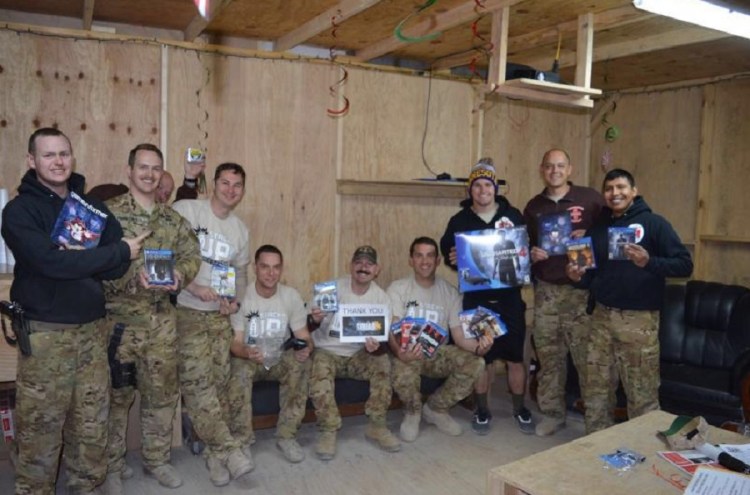Stephen Machuga credits video games for saving his life. In dark days as an Army Ranger captain in Iraq, Machuga escaped being harmed physically. But mentally, it was hard for him to stay focused and keep from panicking.
During his 13 months in Iraq, he narrowly escaped a suicide bombing. After that, he ordered a $5,000 Alienware gaming laptop and started playing The Elder Scrolls III: Morrowind. He lost himself in that game, as well as World of Warcraft, and was able to hide from the horrors of war.
In 2006, he left the military and spent a decade in Washington, D.C. as a government counter-terrorism analyst. But on the weekends, he worked for charities, and discovered Extra Life, which provides video games for sick children and has raised $56 million since 2008 (and funds 170 children’s hospitals in North America). He wanted to do something for veterans, and he helped start Operation Supply Drop. After differences with that group, he started a second charity, Los Angeles-based Stack Up, which provides video games and consoles to active military personnel and veterans.
As Memorial Day approaches, the group is gearing up to draw attention to how video games can help with mental illness and suicide prevention. I spoke with Machuga about his own background, starting his charitable work, and how others can help.
June 5th: The AI Audit in NYC
Join us next week in NYC to engage with top executive leaders, delving into strategies for auditing AI models to ensure fairness, optimal performance, and ethical compliance across diverse organizations. Secure your attendance for this exclusive invite-only event.
Here’s an edited transcript of our interview.

Above: Stephen Machuga is CEO and founder of Stack Up, a nonprofit that helps veterans and active military personnel stay healthy through games.
GamesBeat: Can you tell me about your own background and what led you to start this organization?
Stephen Machuga: I was deployed overseas twice, and both times — gaming has always been a huge piece of my life. Whether it was as a kid growing up — I’d come back home after a hard day at school, and I’d be playing video games. In the military, I’d come back from hard training and sit back on my couch and play video games. Whenever I wasn’t working I was gaming.
Back in the day it wasn’t as prevalent as it as now, where everybody games. You’re a nerd, you’re a geek, you’re sitting in your mom’s basement, all that stuff. You still get some of that stuff. But now it’s more mainstream.
GamesBeat: What was your favorite game or platform growing up?
Machuga: I played whatever. I grew up near a rental store, so it was whatever new shiny box art was on the shelf from Nintendo, and when they started renting out game consoles like the Genesis. I had no real allegiance, like I had this one game for four years. Now it’s a different conversation, where you have games like Warcraft and League of Legends that you sink days and months of your life into.
GamesBeat: Were you into more military or shooter games?
Machuga: Surprisingly not. You’d think — growing up, again, it was whatever came down the pike, whatever had the shiny box art. Let’s try that out for the weekend.
GamesBeat: When did you go into the military?
Machuga: I graduated from college in 1998. I was commissioned into the Army as a second lieutenant. I went ROTC out of Purdue University.
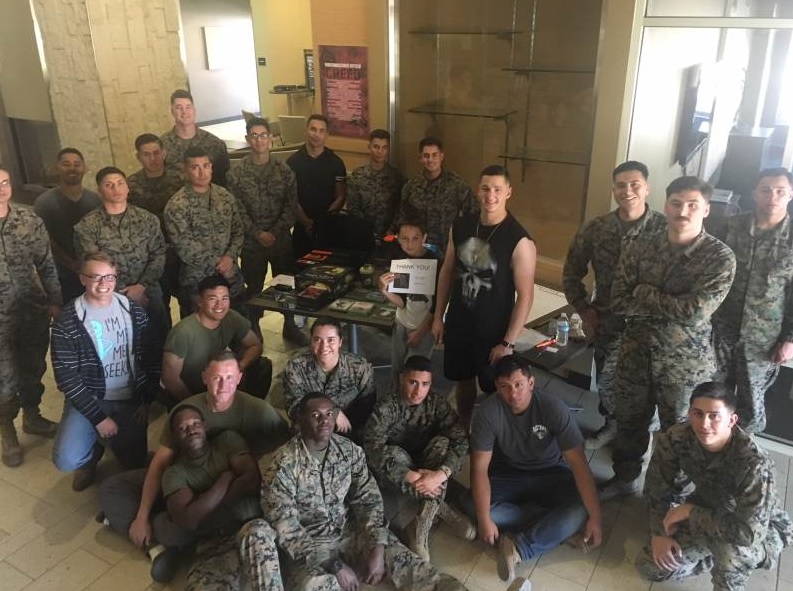
Above: Stack Up supplies games to active duty military and veterans.
GamesBeat: And you eventually reached the rank of captain?
Machuga: Yeah, with time in company. I was promoted to captain, I think, in 2003, right before I went over to Iraq.
GamesBeat: You were a Ranger at that point?
Machuga: Yeah, I had been pinned as a Ranger in the first graduating class of 2000, the new millennium. It felt like a joke. 02-00, the first graduating class of the year 2000.
GamesBeat: How would you describe all of that, that period in your life?
Machuga: I grew up as a nerd and a geek. The military was the fraternity I didn’t know I needed in my life. I didn’t have strong bonds. I was a drama geek growing up. I played video games. I was not a jock, not into sports, not into any of that stuff. And then the military got hold of me, and boy, I drank deep from the well, so to speak, of military culture. As they say in the Army, I was very hoo-ah at the time.
And then the reality sets in as the years start to stack, as you start to lose that youthful exuberance and enthusiasm. Life kicks you in the shin a couple times. Eventually I had had enough.
GamesBeat: You spent 13 months in Iraq. I guess that was plenty for you?
Machuga: Yeah, that’ll do it. The thing that — I had had a close call in June of that year. And then finding out we were going back in nine months to replace the guys who were replacing us at the time — nah. I had no desire to go back to the same spot and take over where we left off nine months later. Nope. We had already been extended over there.
GamesBeat: Did you go in at the very start of the war, or some time after that?
Machuga: Yeah, it was the second iteration. The first ground troops went over in 2002 and we went over in 2003. We still rolled across the border from Kuwait into Iraq. It was still a nerve-wracking experience. We didn’t just fly into Mosul. We had to roll across the border there.
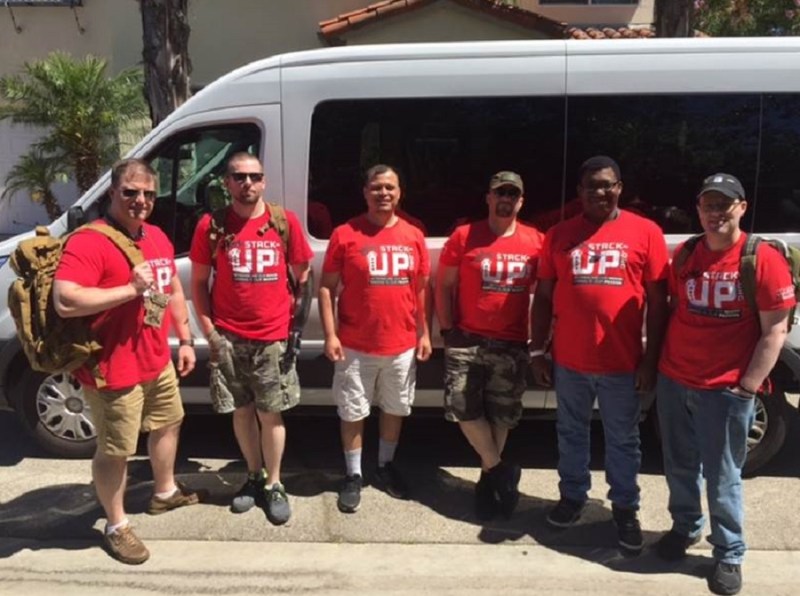
Above: Stack Up’s staff/volunteers.
GamesBeat: How did that shape who you are today, as far as helping you figure out what you wanted to do?
Machuga: I got lucky. Things could have been way different. I might not have made it back. I made it back okay, relatively. There are PTSD issues and other things around that. But I’m glad I did it. I’m glad I did my time. It’s kind of like climbing a mountain or running a marathon. It sucks while you’re doing it, but you always have that experience that you can fall back on. You have this thing that you’re proud of, that you did. My service was one of those things.
I interact with a lot of individuals who almost have to explain why they didn’t serve. You get the story about how they were going to join up, or they joined Junior ROTC and it just didn’t happen for them or whatnot. I’m glad I did my service and I’m glad I don’t have to have those awkward conversations with people. “I was trying to go in and I just didn’t.” But you don’t need to explain yourself. I’m glad I had that experience, being able to serve.
GamesBeat: You said video games really helped you. Do you remember any particular moments about that, games you were playing at the time?
Machuga: My big thing was — the suicide bombing that happened two days after my birthday, I ran back and got online and ordered, more or less, a $5,000 Alienware laptop and had it shipped to me. I said, “Well, why am I saving this money? Things could go bad tomorrow, so I might as well enjoy it while I’m over here.”
One of the games I ended up spending the next six months with was Morrowind. That was one of those games you can’t just play a little bit. It’s an Elder Scrolls game. It was obtuse as hell. It wasn’t nearly as user-friendly as what we have now. I decided to really invest in it, learn it, figure this game out, all the mechanics. That was the game I would come back to every night, coming back from patrol or whatever we were doing. Just randomly wandering the countryside to see what I could see.
World of Warcraft was another big one for me. I got back three weeks before the original World of Warcraft launched. I was not having a good time being back home. I was kind of struggling with the cold-water bath feeling of getting dumped back in the states after being overseas for 13 months. Just struggling, having some issues.
My big thing was trash day, on Tuesdays in Seattle, which is where I was at. On patrol, one of the things you would look out for was — it’s not like they had the sanitation department in Iraq. When people got done with trash they would just throw it on the side of the road. You’d see piles of trash everywhere, and that was generally where insurgents would hide explosive devices. When I came home, trash day would happen with piles of trash everywhere, my brain would just sweat on that. For no apparent reason. It was dumb. I knew I was home. But it was like being afraid of heights and staring over the side of a tall building. Your heart starts racing. I know I’m not gonna jump, but I have this feeling that I could.
I got home three weeks before World of Warcraft. World of Warcraft ended up being this huge time sink for me. I was using it to get away and escape from my brain that was kind of torturing me at the time. It worked as this great thing to calm me down when I was panicking. I don’t want to necessarily say I was triggered, or having panic attacks, but it was along those lines. “I’m struggling to leave the house right now. I know I need to go somewhere, but….”
It ended up working itself out over time. My brain started calming down. I wasn’t scanning the skyline for guys on rooftops or looking for wires coming out of piles of trash anymore. Things went back to normal, so to speak. But a big piece of that was World of Warcraft and being able to hide behind this game.

Above: Microsoft supports Stack Up.
GamesBeat: Was it interesting that these games had almost nothing to do with the modern world, with the combat experience? You’re just going to a completely different world.
Machuga: I’m sure. Some people really dive into those kinds of games, where it’s very military, a lot of realism, your Call of Duty or Battlefield games. Those games are still some of our most requested games when we get supply crate requests. They’re some of the biggest games out there. It’s not just that they’re military shooters. It happens to be that they’re the games that the dollars are are getting put into, marketing and all that. There’s a slew of games out there where people are shooting each other in the face with assault rifles for some reason. That’s a thing that people enjoy.
GamesBeat: You were doing counterterrorism work when you got back, and you mentioned on the site that you were doing charity work on the weekends. Was that how you got back into civilian life?
Machuga: Originally I went down to D.C. to become a government contractor, and that’s where I thought my life was going to end up. Making good money and doing the post-military officer thing. But I wasn’t really happy with what I was doing. It wasn’t where I wanted to be. I was just going through the motions, so to speak. I had a job, but at the time I was also the admin in charge of a group of writers for an organization called Sarcastic Gamer, which is the crew that was behind the start of a thing called Extra Life, the charity organization that really kicked things off in the space. That’s for, obviously, sick children, supporting them.
While I was helping out there I got my first taste of video game charity. I didn’t have that connection to children, though. I didn’t have any children of my own. I don’t have the love for kids that a lot of people do. I just felt like I didn’t have a connection there. About that time, in 2009, one of my guys who was with me in Iraq re-enlisted, and was immediately sent back over to Afghanistan. He reached out to me and said, “Hey, can you get us an Xbox or something? We have nothing to do over here. We’re in a new location. You have connections to the game industry. Can you see what you can do?”
I reached out, started asking on my own, and sure enough — it was Dan Amrich, over at Activision at the time, when he was still in his sports phase, he said, “Yeah, we’ve got all kinds of stuff.” Suddenly a pallet worth of donations showed up. It was something — to know that developers and studios just have this stuff laying around in closets, okay, there’s something here. Let’s dig a little bit.
We ended up sending over a bunch of DJ Hero, Guitar Hero bundles, Xboxes, all kinds of stuff. Of course we got back these great pictures of guys in DJ Hero competitions using briefing projectors to put the game up on the side of conex shipping boxes. It was nice. Word got out over there that there’s some crazy guy back home who’s sending all this stuff. All you had to do was reach out to him and see if he could hook you up.
It turned to this cyclical loop of people sending requests. I had more than enough demand to go around for a while. It started there. Hey, wait a minute, we have a thing here. So I started pushing. What if we could do something like Extra Life for troops? To this day I’m surprised that nobody else has really tried to emulate it at all. I would think there’d be half a dozen charities popping up around me trying to do what we’re doing. I don’t know if that’s a good or a bad thing. But it’s been good for us, obviously.
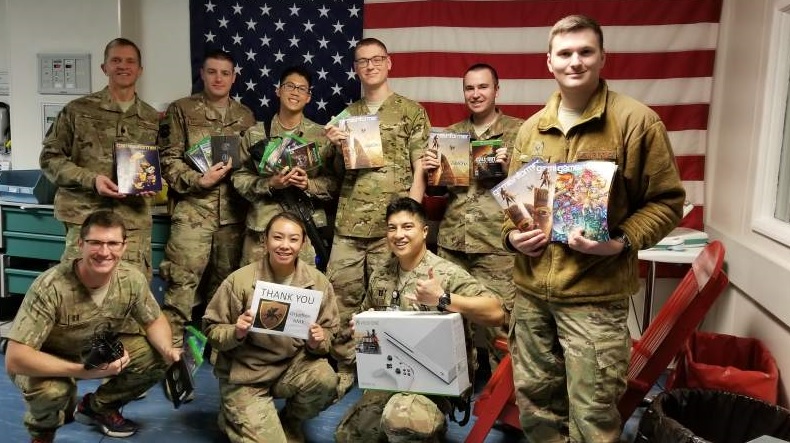
Above: Stack Up sends video games and consoles overseas.
GamesBeat: By 2015 that morphed into your own charity. Did anything directly precede that?
Machuga: There had been another charity prior called Operation Supply Drop. That was my original charity. I was removed from my position at Operation Supply Drop on the five-year anniversary of its founding, ironically. But it all worked out. It was one of those things that — at the time that was devastating, putting five years into the organization, the branding, all the work we had done. But it worked out for the best.
GamesBeat: Stack Up began in 2015, then?
Machuga: Yeah, in November 2015. We launched on Veterans Day. We’re going into year four now.
GamesBeat: Does Stack Up do something different than your previous organization?
Machuga: Yeah, that was one of the big arguments with my old business partner. He didn’t see the value in the whole gaming piece. It was more about, we should just be a generalized military support organization and still do gaming stuff, but gaming’s not lucrative. You have trouble talking to silver-hairs at Fortune 500 companies about video games. But gaming was why I started this thing. It’s the thing that differentiates us from everybody else out there. There’s about 10,000 military charities out there. None of them deal with gaming. There are already enough charities doing good work with veterans. What we’re doing is bringing that into a new space that has no real effort being organized.
As we’re starting to see with organizations like Wounded Warrior and the VA, they’re starting to dip their toes into the gaming space, because they see dollars. They see blood in the water with Twitch. How can we get a part of that? We just happen to have a head start on that. It started off as a carbon copy of Supply Drop, and now it’s branched out dramatically with the inclusion of our work with the Centers for Disease Control, fighting veteran suicide, which is a new piece for us in 2019.
Now we’re sending guys to the American Association of Suicidology conference in Denver. We have guys who are talking to the VA and the National Institutes for Health about mental health. Again, this is not what I was expecting a couple of years ago, but — we’ve gone from kind of supporting guys’ mental well-being, helping out as far as morale goes and keeping people keepy. But now we’re actively saving people’s lives with our program. It’s an incredible feeling. It’s a whole different ballgame now.
GamesBeat: It feels like there’s a lot of game-related charities that have come into their own in recent years. There’s Able Gamers, Humble Bundle. There’s Extra Life, which you mentioned. They all seem to have different purposes, but they’re building higher profiles.
Machuga: Actually, with Able Gamers, they were doing stuff before we got started. They’ve been grinding away for a long time. They really found their purpose with the announcement of the XAC from Microsoft. They’re finally getting their shot. Extra Life has never had a problem. They’re part of Children’s Miracle Network, so they’ve had a — that’s the thing. There are two different tiers of charities out there. There are the charities that are supported by major organizations like St. Jude’s, and then there’s the base of charities like myself, Able Gamers, Child’s Play. Child’s Play is part of Penny-Arcade, which is nothing to sneeze at, but they don’t have a hospital in Tennessee where they fly people out to raise money. There’s just two different levels.

Above: Stack Up is a regular at events like PAX.
GamesBeat: There are also things on the developer side like Games for Change.
Machuga: Yeah, or CODE, the Call of Duty Endowment at Activision, things like that. They have their own things they’re doing.
GamesBeat: Is there a feeling that this is a more important conversation, or people are more willing to pay attention and talk about this?
Machuga: Since the inclusion of our Overwatch program, our suicide awareness and prevention team — that’s our group on Discord where we have 24/7 support for individuals, not just veterans, but civilians as well. Anybody who feels they need somebody to talk to, veteran or not, you can come in at any time of the day or night and we can help them out and get them to a point — we’ve had health and wellness checks. We’ve had police go in and confiscate weapons from people, because we felt they were a threat to themselves. We’ve actively saved lives through this program, which is stunning to think about.
Not everybody can say they’ve been a veteran, but we’re going into an age where everyone feels like they have mental health issues of some kind or another. There are a lot more people out there who struggle with anxiety and suicidal ideation and things like that. That’s opened up the floodgates as far as people getting behind us. Now everybody can feel like — they’re not just helping veterans. They’re helping their neighbors and their friends who might also have these problems too.
An organization like Take This, which is an awareness organization, is now talking about utilizing us for resources, because we’re actively providing support. It’s not just an awareness campaign. We’re providing the support that they’re saying to go get, which is crazy to think about. I love the guys over at Take This, but it was definitely a surprise conversation. “We should start promoting you guys.” I never thought of that, but yeah, I guess you should.
GamesBeat: Have you ever talked about how many people you’ve helped, or donations that have come in?
Machuga: Yeah, we have an infographic we’re getting done right now as far as numbers go. We’re just wrapping on our annual report right now, which goes into our numbers for last year.
GamesBeat: You mentioned Memorial Day. Do you have something special coming?
Machuga: We do. I’m still waiting to lock in — we’re supposed to do something over in Vegas. I don’t want to go into detail if it’s not going to happen. But we’re trying to do that. And then the usual — because the larger charities push out in April and also November, there’s really no way for us to get some time to ourselves, you might say. We have to do charity fundraising events more frequently, because right now everybody’s talking about St. Jude’s, but it’s also military appreciation month in May.
We want to make sure people understand, we’re doing stuff in May, but we can do stuff any time. If you want to do stuff on the fourth of July, you want to do stuff in August, we can do it whenever you want. Let us know and we’re happy to make some noise for you. Those are our two major funding periods through the year — May, which is military appreciation month, as well as mental health awareness month, and then November, which is Veterans Day and Remembrance Day, in the states and in the U.K. That’s also St. Jude’s, and then Extra Life is the weekend before Veterans Day. It makes it tough to get out from under them, but we do what we can.
GamesBeat: How is it working with the game industry today? What sort of interesting relationships do you have now?
Machuga: As I said, there are definitely a lot of games out there that seem to be taking advantage of the whole people shooting each other in the face with assault rifles, but we’re not getting the support you would think we would get. We struggle with a lot of — there’s a common misconception out there, when you deal with adult charities, that the people who you are servicing have done this to themselves. The veterans we’re helping get a fraction of a fraction of the population that say, “Well, they signed up. They knew the risks. We don’t want to help them.” That’s why children’s charities do so well in the space, because they’re blameless victims, which I completely understand.
But it’s the difference between an organization like an Extra Life and a 1UpOnCancer, which is a small charity like ours that focuses on providing support to adults with cancer, not just kids. They’re over there struggling away, because again, well, that guy probably smoked three packs of cigarettes a day and brought that on himself. That may or may not be the case, but — people have a tendency to consider, well, this is their fault, so we don’t need to help them.
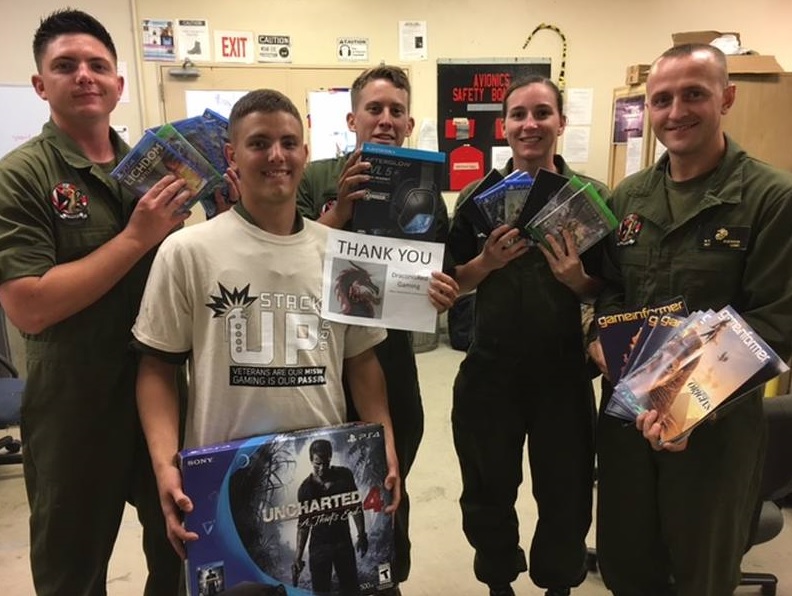
Above: Stack Up helps with “air assaults” that get veterans to gaming events.
GamesBeat: There’s a stigma to overcome before you can make people listen to you.
Machuga: Absolutely. That’s why these other charities are so successful in the space. There’s one less hurdle that these organizations have to deal with. I’ve made a joke, that if somebody ever wanted to get in the space and have a successful charity, you need to find a charity that supports sick puppies or something like that. Again, blameless victims that people can feel sorry for, people just throw money at them. That’s just the truth. No getting around it.
But that doesn’t mean that what it is we do isn’t that much more important. As a matter of fact, I think it’s more important, because it’s a harder job. It still needs to be taken care of. Our responders need help as well. Just because they’re the over the game of 21 doesn’t mean they didn’t do their job. I get a little sensitive when it comes to this. It’s a frustrating position to be in. Everyone gets really excited about supporting the troops, but when you ask them, when it actually comes down to it, it’s kind of pulling teeth.
GamesBeat: What do you find that people responds to, or that resonates about your message and the events you do?
Machuga: As much as I talk about not getting support from people, you always have the other side of the coin. Rah-rah flag-waving veteran-lovers, and God bless them, they provide a lot of the support to what we do. Those are the guys for whom it doesn’t matter. They understand why it’s important. That resonates.
And as I said earlier, the mental health awareness piece we provide has been opening us up to a lot of people who would have otherwise walked right past us, because it’s something that they themselves can — not appreciate, but they can understand. It’s not just about PTSD. It’s about mental health awareness in general. They may have dealt with suicidal or homicidal ideation, things like that, issues that they can get behind because they have felt that way. They may not have been in the service, but they can understand that part of it. That’s been opening a lot of doors for us, which wasn’t expected at all.
Our Overwatch program started out as a community-driven effort, because when you put a bunch of veterans in a room together, eventually the conversation is going to get pretty dark. Some people are going to say some shit, and next thing you know, hey, if we don’t do something we’re going to lose one of these guys. It started up as a knee-jerk reaction to having a community of veterans who needed help and who didn’t have anything in place for them. It started off small, and over time turned into this — we should really look into doing something about this.
It’s taken a dramatic turn. That’s where the CDC came in, because they got hold of that and fell in love with it. “This is amazing. They’re helping people where they’re comfortable, and using a medium they feel comfortable with, through gaming.” Which, again, I didn’t realize. I did an interview back in the day with Polygon. They sent out a video team with my house and set me down in front of — this must have been a calculated thing. They had me playing Battlefield and asked me questions while I was playing. The answers I came up with while I was distracted — I watched the video afterward and thought, “I can’t believe I said all this stuff.”
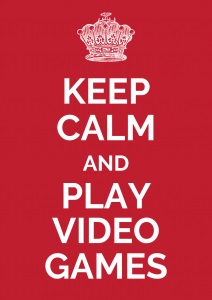
Above: Stack Up’s motto.
I don’t know what this is. I’m sure there’s a term for it. But because I was distracted — it’s like when you watch Law and Order SVU, when they’re talking to kids they put them in front of a coloring book, and they just ask them questions. We’re kind of doing the same thing. They don’t have their PR face on, their PR training, because they’re playing video games and swearing at NoobSmasher69. You’re not as guarded. I don’t know what that is, but it’s definitely something that happens. It’s what they’re looking at right now.
GamesBeat: It’s disarming to play Battlefield, I guess.
Machuga: It’s not even just that. Doing something where you’re not fully focused on, “I am sitting with a psychiatrist who’s asking very pointed questions about my life,” but instead, “I’m just talking with someone and having fun playing video games.” It’s a great way to broach topics that people may not feel comfortable with by putting a candy-coated shell around it, playing video games with them. I need to find out what that’s called, because I know there has to be something to it.
GamesBeat: How do you feel about social media and the ways that can be helpful? I notice there are more people now who go out on social media and ask for help than I’ve seen in the past.
Machuga: I think that’s why things have been more interesting for us over the years. People are reaching out via social media, and people are in turn letting those people know that we exist and we’re here to help. We’re able to provide more support based on social media. It’s been very useful. I’ve found it extremely helpful.
GamesBeat: There’s still a lot of rage out there on social media as well. I guess it’s good to stay out of all that.
Machuga: Yeah, there’s no getting away from it. We’re in a very sensitive time in America. It’s tricky right now. It’s one of those things where you try to walk — it’s hard, on social media. I find myself deleting tweets and Facebook posts all the time and replacing them with pictures of puppies. I can’t tweet about that, so here’s a puppy. It’s one of those things where you do what you can with it. When used correctly it can be a force for good, but right now it’s very easy to get caught up in some real fistfighting online.
GamesBeat: As far as your goals for the future, beyond Memorial Day, what are some of those?
Machuga: One of our strategic missions for the charity was always to have video gaming taken seriously. Not just as — it helped me when I needed it. I didn’t realize that at the time, but it was one of those things where it saved me a lot of heartache and self-medication by just hanging out in Azeroth for 12 hours a day. [laughs] But I feel there’s value, that there could be therapeutic uses for gaming in the mental health space. I want to continue to see gaming be used positively in the space. I’m also a big fan of just letting — gaming is amazing. I love what gaming did for me, and I want people to feel as excited and happy about the industry as I do. That’s another big piece.
We’re in the middle of military appreciation month right now in May, and we’re running our Call to Arms event, which is our big online fundraiser for Twitch streamers, getting out and doing different events. If you want to find out more, just head over to stackup.org. Our Discord is discord.gg/stackupdotorg.
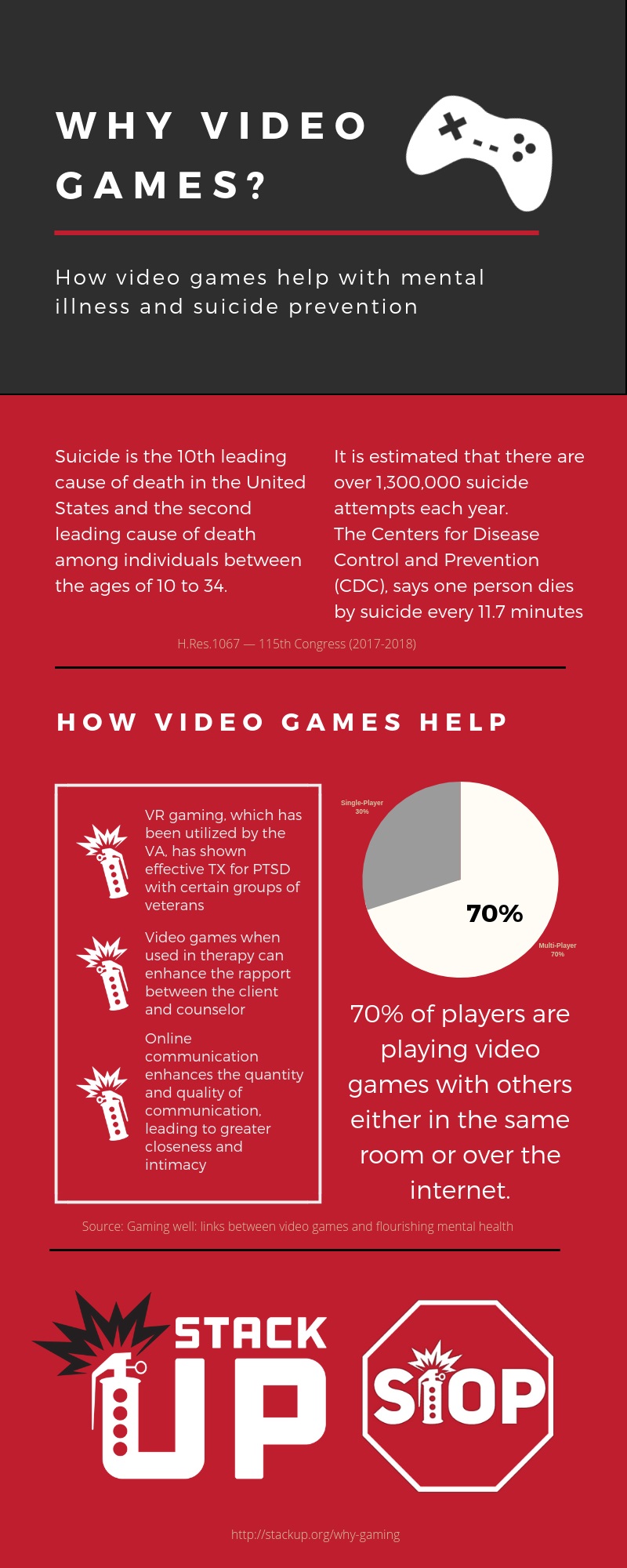
Above: Video games can help with suicide prevention.
GamesBeat: It sounds like you never really worried about whether games might have the opposite effect — that they could be bad for you or bad for society in general.
Machuga: Yeah, you always have the detractors out there. That’s anything, though. Everything in moderation. You could sit in the library and read books for 14 hours if you wanted to. There’s violent imagery and toxic environments out there, but that’s really anywhere. As toxic as things can get, the opposite is true as well. You can bring people together and form communities that can help one another. As we’re seeing here, through the use of gaming for mental health awareness and support — I’m willing to overlook the possible negatives.
You have to get people where they feel comfortable. Gaming right now is something a lot of people do from their homes, on their phones. It’s everywhere now. It’s no longer just the nerds and geeks in their basements. It’s become a bigger thing. We’re in the rock and roll period of the ‘60s, where you had Congressmen testifying and people talking about how it’s ruining America. Is it really? There are probably bigger things out there to worry about than this. I see the value here versus the negatives.
The old guard will eventually work their way out of places of influence. The kids who grew up with iPads and Minecraft will be our next senators and Congressmen. We’ll have a president someday who’s beaten Grand Theft Auto.
GamesBeat: We’ll probably have a Fortnite esports star as president someday.
Machuga: It’s a crazy thought, but we’re getting down that road. It’s just a big population contest. You get enough people behind something, nothing is impossible. In 20 or 30 years, who knows?
GamesBeat: Thank you for your service.
